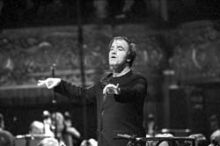On October 19, the Ukraine National Palace in Kyiv hosted a single concert of the Mariinsky Symphony Orchestra and Choir (St. Petersburg) directed by Maestro Valery Gergiyev flying in from New York for just one day, interrupting rehearsals of Tchaikovsky’s Mazepa at the Metropolitan Opera.
Gergiyev selected a stunning program for Kyiv: Prokofiev’s cantata Alexander Nevsky for choir and orchestra; Tchaikovsky’s overture Romeo and Juliet; Mussorgsky’s Pictures from an Exhibition, orchestrated by Maurice Ravel. The Maestro says, “I conduct what has made an impact on my life... I equally enjoy directing operas, ballets, and symphonies. I only distinguish between good and bad music...”
Without in any way belittling various excellent concert tours held in connection with the Year of Russia in Ukraine, it would be no exaggeration to say that Gergiyev’s first visit to this country marked an epochal event. Ranking on a par with the world’s top three conductors, he is sought by music lovers, kings, princes, presidents, and other rich and famous all over the world, if only to hear an orchestra play under his direction, especially when performing Russian music.
Gergiyev works with the Mariinsky opera and ballet troupes 250 days a year. Since 1995 he has been chief guest conductor with the Rotterdam Philharmonic, and since 1997 with the Metropolitan Opera (the guest conductor’s post was first introduced there specially for Gergiyev). He has conducted world-known philharmonics in Vienna, New York, Chicago, Berlin, London, Royal Opera, the National Orchestra of France and of Swedish Radio, orchestras of Cleveland, San Francisco, Boston, Toronto, Chicago, Dallas, Houston, Minnesota, Montreal, Birmingham, Philadelphia, Santa Cecilia, Covent Garden, and even La Scala. He has recorded twenty operas and most of the symphony repertoire and initiated cooperation between the Mariinsky Theater and the world’s leading opera houses, including Metropolitan Opera, Covent Garden, Carlo Felice, San Francisco Opera, La Scala, the New Opera of Israel, and the Theater of Chatelet. Gergiyev and the Mariinsky troupe have toured far and wide, all over Europe, Latin America, US, China, Japan, and Australia. His status makes Gergiyev a heir of the legendary Herbert von Karajan.
Some conductors never leave home without their baton; others believe that only their hands can convey the finest nuances of their message to the orchestra. Valery Gergiyev belongs to neither category. At times he conducts operas without a baton, relying on his fingers flitting like birds. Other times he uses the baton in a powerfully arresting performance, and then the audience and critics comment breathlessly on his fantastic energy, demoniac countenance, wild temperament, and fantastic musical talent. He is compared to the mythological rebel hero Prometheus shaping men out of clay and endowing them with the spark of life, teaching them arts, stealing fire from Olympus and bringing it to humanity, and finally being punished by Zeus who chained him to a rock. Often, it is added that the whole thing happened in the Caucasus, Valery Gergiyev’s homeland.
It is true that the Maestro emerges as the most charismatic conductor. There are legends about his unique creative temperament and capacity for work verging on the superhuman. The celebrated tenor Placido Domingo, Gergiyev’s friend and another world-known workaholic, noted in amazement, “He works even more than I do.”
When Queen Elizabeth and Princess Margaret (an old friend and devotee of the Mariyinsky Theater) decided that a performance by that troupe would be the present for the Queen Mother’s 100th birthday during the festivities in London, and an event of international import, Gergiyev interrupted his performance at a festival in Saltsburg and flew to the British capital to conduct Rimsky-Korsakov’s Scheherazade. His visit was described by The Times as an excellent present and a truly royal soiree.







